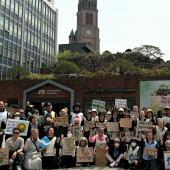EDSA Revolution not a political win but fulfillment of Mary’s promise, says Filipino bishop
A Filipino bishop reflected on how the People Power Revolution, a series of demonstrations in the Philippines in 1986, was not about the victory of one political party but a fulfillment of the Virgin Mary’s promise of peace.
Malolos Bishop Dennis Villarojo said that the presence of Mama Mary’s image in the so-called EDSA Revolution allowed the Filipinos to put an end to the dictatorship of former president Ferdinand Marcos Sr. and regain democracy in a non-violent way.
“EDSA was not a victory for one party and the defeat of another. It was not a triumph of one family vanquishing another. It was as the fulfillment of a promise, a particular instance of a triumph of the Immaculate Heart of Mary,” he said.
The bishop was delivering the homily during the canonical coronation of the National Pilgrim Image of Our Lady of Fatima in Valenzuela City on February 25, the 38th anniversary of the People Power Revolution.
During the EDSA protests, the faithful brought out this revered statue to serve "not as a standard of battle but a symbol of peace."
Therefore, Bishop Villarojo challenged the faithful to live out the memory of the EDSA Revolution not by looking “on the other half of our nation as losers” but by finding the courage to find the truth.
“We were witnesses to God’s almighty hand at EDSA. We cannot look back [on] it by merely placing ourselves on either side of the line that divides our country. That would be self-referential,” said the bishop.
“We cannot say, ‘It was bad for me’ or ‘It was good for me,’ and then shift on one side or the other depending on who has the upper hand. Like Our Lady, [we] must listen, ponder, and do whatever the Lord tells us,” he added.
The bishop also emphasized how the EDSA Revolution inspired non-violent uprisings in other parts of the world, particularly the demonstrations in Europe that led to the fall of the Berlin Wall in 1989.
“EDSA may not be the only spark that started it all, but it was certainly the model that revolutionised all revolutions. From then on, revolutions were no longer fought by arms but with rosaries and flowers,” he said.
Archbishop John Brown, Apostolic Nuncio to the Philippines, led the canonical coronation of the National Pilgrim Image of Our Lady of Fatima, signifying the papal authority of the celebration.
Philippine bishops and clergy, most notably Fr. Carlos Manuel Pedrosa Cabecinhas, rector of the Shrine of Our Lady of the Rosary of Fatima in Portugal, graced the event.
The City Government of Valenzuela, under Mayor Wes Gatchalian, had representatives present at the canonical coronation. -Luke Godoy
Radio Veritas Asia (RVA), a media platform of the Catholic Church, aims to share Christ. RVA started in 1969 as a continental Catholic radio station to serve Asian countries in their respective local language, thus earning the tag “the Voice of Asian Christianity.” Responding to the emerging context, RVA embraced media platforms to connect with the global Asian audience via its 21 language websites and various social media platforms.
















